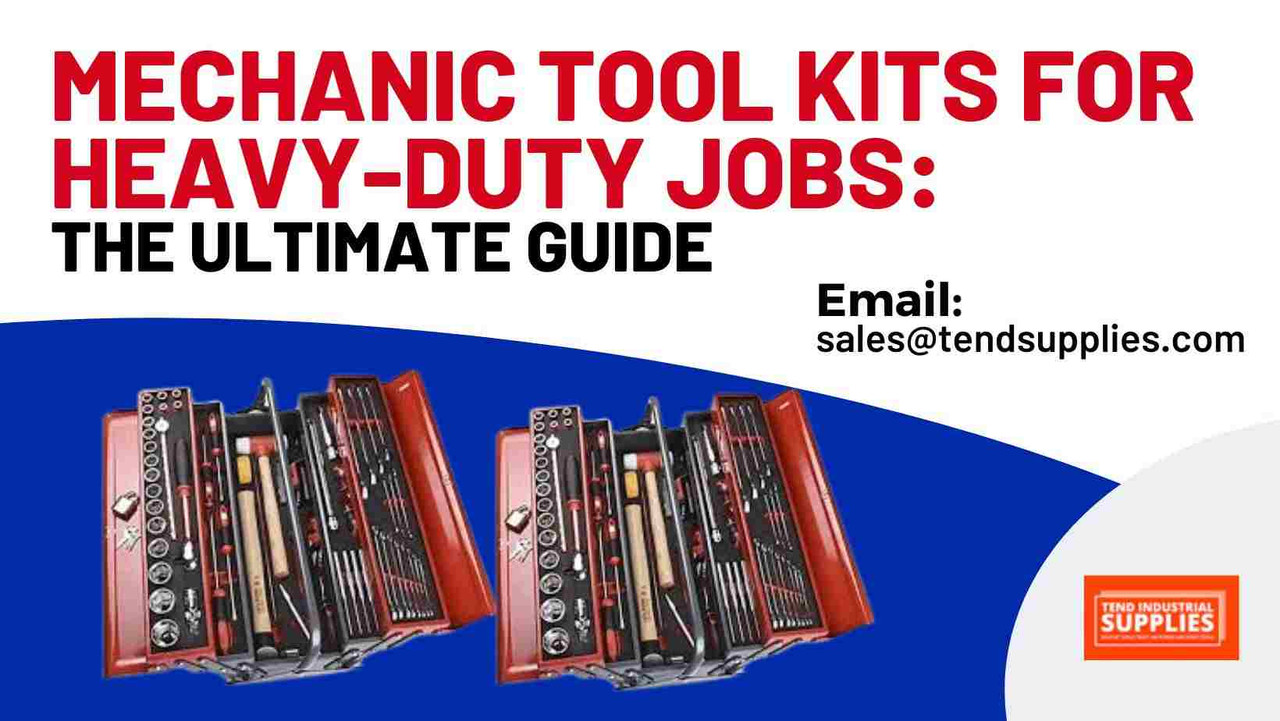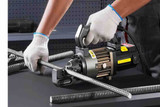Mechanic Tool kits for Heavy-Duty Jobs: The Ultimate Guide
Having the right tools can make all the difference between a job well done and a frustrating experience. A well-equipped mechanic tool kit is essential whether you're working on massive construction equipment, industrial machinery, or commercial vehicles. This comprehensive guide explores everything you need about mechanic tool kits for heavy-duty jobs, helping you make informed decisions and boost your productivity.
Key Takeaways
- Investing in a high-quality heavy-duty mechanic tool kit is crucial for efficiency, safety, and job quality in professional settings.
- Essential components include comprehensive socket sets, various wrenches, pliers, screwdrivers, hammers, pry bars, and precision measuring tools.
- When choosing a kit, consider job requirements, budget, brand reputation, warranty, and potential for expansion.
- Proper maintenance of your tools, including regular cleaning, inspection, and storage, is vital for longevity and performance.
- Stay informed about technological advancements in tools to keep your kit up-to-date and maximize your capabilities.
Understanding the Importance of Quality Tools
The stakes are high for heavy-duty mechanical work. The equipment you're working on is often expensive, critical to operations, and potentially dangerous if not properly maintained. That's why investing in high-quality mechanic tool kits is crucial. These tools are designed to withstand the rigors of heavy-duty work, providing the durability, precision, and reliability you need to tackle even the toughest jobs.
Key Features of Heavy-Duty Mechanic Tool Kits
- Durability: Heavy-duty tools are built to last, often featuring reinforced construction and materials like chrome vanadium steel.
- Versatility: A good kit includes various tools to handle various tasks, from basic repairs to complex diagnostics.
- Ergonomics: Comfortable grips and well-balanced designs reduce fatigue during long work sessions.
- Storage Solutions: Many kits come with sturdy cases or tool chests for organization and portability.
- Warranty: Look for kits that offer solid warranties, indicating the manufacturer's confidence in their products.
Essential Components of a Heavy-Duty Mechanic Tool Kit
1. Socket Sets
A comprehensive socket set is the backbone of any mechanic tool kit. For heavy-duty work, you'll need:
- Standard and deep sockets in both metric and SAE sizes
- Impact sockets for use with power tools
- Extensions and adapters for hard-to-reach areas
- Ratchets in various sizes and drive sizes (1/4", 3/8", 1/2", and 3/4")
2. Wrenches
A variety of wrenches are essential for heavy-duty work:
- Combination wrenches in metric and SAE sizes
- Adjustable wrenches for flexibility
- Torque wrenches for precise tightening
- Pipe wrenches for plumbing-related tasks
3. Pliers and Cutters
These versatile tools are indispensable:
- Slip-joint pliers
- Needle-nose pliers
- Diagonal cutters
- Locking pliers (vise grips)
- Wire strippers
4. Screwdrivers
A good selection of screwdrivers is crucial:
- Flathead and Phillips in various sizes
- Torx drivers for specialized fasteners
- Insulated screwdrivers for electrical work
5. Hammers and Striking Tools
Heavy-duty work often requires some persuasion:
- Ball-peen hammers
- Sledgehammers
- Rubber mallets
- Dead blow hammers
6. Pry Bars and Pullers
For separating components and removing stubborn parts:
- Pry bars in various lengths
- Gear pullers
- Bearing pullers
7. Measuring and Diagnostic Tools
Precision is key in heavy-duty mechanics:
- Digital calipers
- Micrometers
- Multimeters
- Pressure gauges
- Infrared thermometers
8. Specialty Tools
Depending on your specific needs, consider including:
- Torque multipliers
- Air tools (impact wrenches, ratchets, etc.)
- Hydraulic jacks and stands.
- Welding equipment
Choosing the Right Heavy-Duty Mechanic Tool Kit
Selecting the perfect tool kit depends on several factors:
- Job Requirements: Consider the types of equipment you work on most frequently.
- Budget: While quality tools are an investment, there are options for various price points.
- Brand Reputation: Research reliable brands known for their heavy-duty tools.
- Warranty and Support: Look for manufacturers that stand behind their products.
- Expandability: Choose a kit that allows for easy additions as your needs grow.
Maintaining Your Mechanic Tool Kit
Proper maintenance ensures your tools will last for years:
- Clean After Use: Wipe down tools to remove dirt, grease, and moisture.
- Proper Storage: Store tools in a dry, organized space to prevent rust and damage.
- Regular Inspection: Check for wear and damage, replacing tools as needed.
- Lubrication: Keep moving parts lubricated for smooth operation.
- Calibration: Regularly calibrate precision tools like torque wrenches.
Safety Considerations
Safety should always be a top priority when working with heavy-duty equipment:
- Personal Protective Equipment (PPE): Always wear appropriate safety gear.
- Tool Condition: Never use damaged or worn-out tools.
- Proper Usage: Use tools only for their intended purpose.
- Work Environment: Ensure your workspace is well-lit and free of hazards.
- Training: Stay up-to-date on proper tool usage and safety procedures.
Investing in Your Career
A high-quality mechanic tool kit is more than just a collection of tools; it's an investment in your career. With the right tools at your disposal, you can:
- Increase efficiency and productivity
- Take in a broader range of jobs
- Reduce the risk of equipment damage
- Improve the quality of your work
- Enhance your professional reputation
The Future of Heavy-Duty Mechanic Tools
As technology advances, so do the tools of the trade. Keep an eye out for emerging trends:
- Innovative Tools: Digital torque wrenches and Bluetooth-enabled diagnostics tools.
- Advanced Materials: Lighter, stronger alloys for improved tool performance.
- Ergonomic Innovations: Tools designed for even greater comfort and reduced strain.
- Eco-Friendly Options: Sustainable manufacturing and battery-powered alternatives to pneumatic tools.
Conclusion
Investing in a high-quality mechanic tool kit for heavy-duty jobs is essential for any serious professional. By choosing the right tools, maintaining them properly, and staying up-to-date with industry advancements, you'll be well-equipped to tackle even the most challenging tasks confidently and precisely.
Ready to upgrade your heavy-duty mechanic tool kit? Explore our selection at Tend Industrial Supplies and take your work to the next level. Don't hesitate to contact our team at sales@tendsupplies.com for personalized recommendations and expert advice.
Frequently Asked Questions (FAQs)
Q: How much should I expect to spend on a quality heavy-duty mechanic tool kit?
A: The cost of a comprehensive heavy-duty mechanic tool kit can vary widely, typically ranging from $500 to $5000 or more. The price depends on the number of tools included, brand reputation, and material quality. While it's a significant investment, remember that quality tools can last for decades with proper care.
Q: Are there advantages to buying a pre-assembled kit versus building my own?
A: Pre-assembled kits often offer better value for money and ensure you have a comprehensive set of tools that work well together. They also typically come with a sturdy storage solution. However, building your own kit allows for more customization based on your specific needs. Consider starting with a quality pre-assembled kit and adding specialized tools as needed.
Q: How often should I replace my heavy-duty mechanic tools?
A: High-quality, heavy-duty tools can last many years with proper care and maintenance. Replace tools when they show signs of wear, damage, or decreased performance. Regularly inspect your tools and replace any compromised to ensure safety and efficiency.
Q: What's the difference between standard and impact sockets?
A: Standard sockets are designed for use with hand ratchets and offer precision for general use. Impact sockets are thicker and made of a more ductile steel to withstand the high torque and vibration of power tools. Always use impact sockets with impact wrenches to prevent shattering and potential injury.
Q: Are battery-powered tools reliable enough for heavy-duty mechanical work?
A: Modern battery-powered tools have improved greatly in power and reliability. Many professional-grade cordless tools now rival their corded or pneumatic counterparts in performance. They offer the advantage of portability and continually improve battery life and durability. However, pneumatic tools may still be preferred for some high-torque applications.
For all your heavy-duty mechanic tool needs, visit Tend Industrial Supplies at tendsupplies.com or contact our expert team at sales@tendsupplies.com for personalized assistance.









